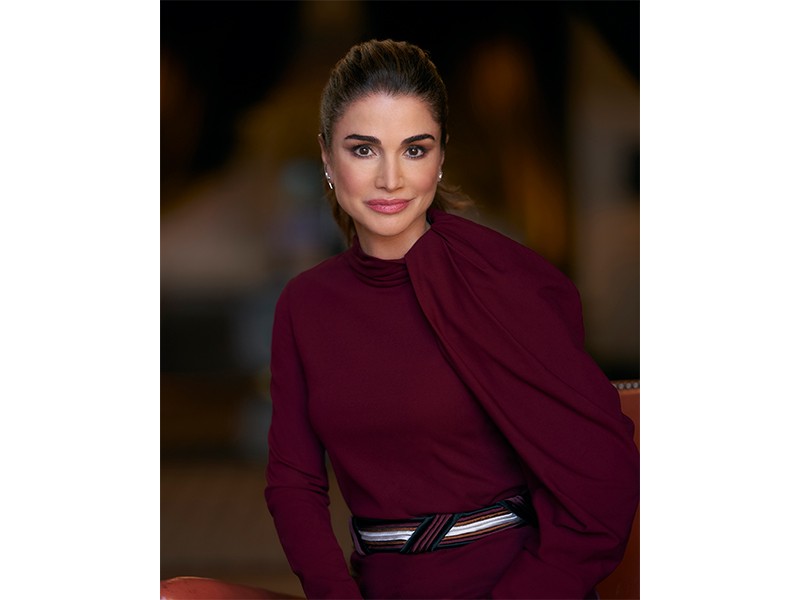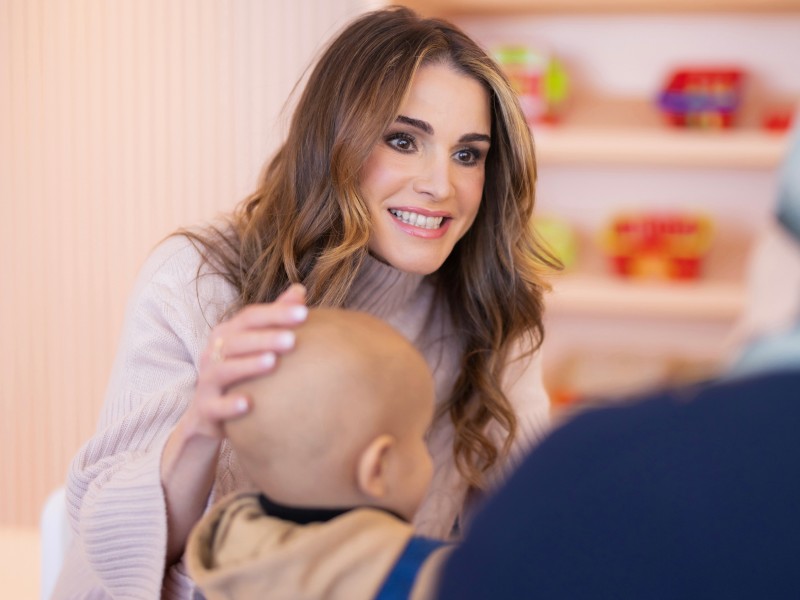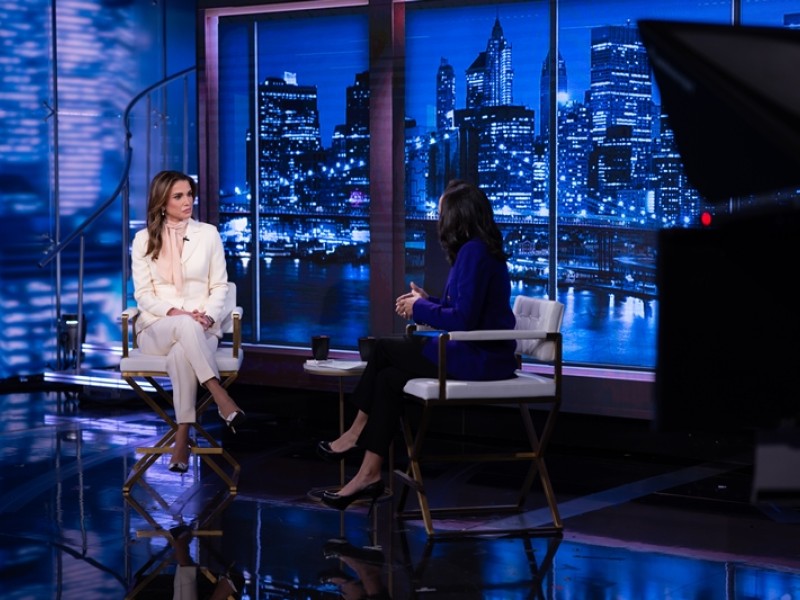Queen Rania's Interview with HELLO! Magazine
Barely two-and-a-half months since she gave birth to her fourth child, Queen Rania is back at work. She is all smiles and graciousness as she strides purposefully across the cool marble floor of her seaside villa in Aqaba, hand outstretched, in a pair of skinny jeans and a fashionable loose shirt.
She has recently returned from the historic funeral of Pope John Paul 11 and had hoped to attend the marriage of close friend Prince Charles to Camilla Parker Bowles. "It was impossible to go because I am still breastfeeding and couldn't be away from my baby another night" she confides with surprising candour. "I am so happy for them. Together they will be a great team - but your press has been very cruel to her."
Queen Rania, now 34, was a reluctant celebrity herself when she was thrust into the limelight six years ago when her husband, King Abdullah 11, succeeded his father, the much-loved King Hussein, making her the world's youngest queen.
Born in Kuwait of Palestinian parents (some 60 per cent of the population in Jordan are Palestinian), she had been living in Jordan since 1991, when her family fled the Gulf War. She graduated in business administration from the American University in Cairo and was working for Apple Computers in Amman when she met Abdullah at a party in January 1993. The couple married the following June, but it was only two weeks before his death in February 1999 that King Hussein altered the line of succession, designating his eldest son Abdullah, instead of his younger brother Crown Prince Hassan, as the next King.
Whilst Queen Rania insists she is still at times uncomfortable in the spotlight, she is nevertheless a natural in front of the camera. Her model figure, impeccable stye and captivating beauty have earned her a reputation as the world's most glamorous monarch - and predictable comparisons with Diana, Princess of Wales. Yet she is dismissive of such accolades, preferring to steer the conversation back to the many groundbreaking issues - including the controversial subject of child abuse-which she is tackling in Jordan.
Serious talk, however, will have to wait. The weekend home in Aqaba is primarily a place of fun and relaxation for the couple and their four children, Prince Hussein, ten, Princess Iman, eight, Princess Salma, four and new baby Prince Hashem, who was born on 30 January- his father’s 43rd birthday. His Majesty, in T-shirt and chinos and with baby in arms, has appeared requesting the presence of his wife at lunch - for which, he declares proudly, he has rustled up some superb steaks on the barbecue.
We are more used to seeing King Abdullah in full military regalia, or alongside world leaders. At their home in Aqaba, however, this warm and unpretentious young King - Hussein’s son from his second marriage to British-born Princess Muna - horses around with his children, or tinkers with one of his Harley Davidsons.
Former guests here have included Tony and Cherie Blair, but are more usually members of the couple’s extended family and mutual working friends from the early days of their relationship. "It keeps us in touch with the real world," says Queen Rania, relieving her husband of their baby son.
In this exclusive interview and photo shoot, with HELLO!, she gives a rare insight into her life as a modern monarch and working mother, who has established herself not only as a role model for women throughout the Arab world but as a symbol of cross-cultural communication between Islam and the West.
Your Majesty, have you found motherhood easier fourth time around?
"You would think that I would be more confident and unperturbed by the whole thing by the fourth time around, but I’m not. In fact, in many ways it feels like he is my first baby and I still find myself nervous and fumbling at times. I’m certainly no less tired than I was with my other children. And the disarray and disruption to daily life that a newborn inevitably brings still requires a lot of organisation.
"Thankfully, experience has taught me to be kinder to myself. I see a lot of young women these days trying to lose all the weight, resume work and get back to ‘normal’ life soon after their baby is born and I always think, “What’s the rush?” Everything will happen in due course. Setting high expectations can result in the burden of unwarranted stress and missing out on the little joys that come with a baby."
How have your other children responded to Hashem's arrival?
"Having a baby is a great reminder of just how much love we are capable of feeling and giving. Like us, his brother and sisters are overjoyed and are doting on him."
"I made a conscious effort this time to scale back my activities and reduce my workload so that I could enjoy every stage - I am at a time in my life where I don’t take anything for granted. This meant that I was able to spend more time at home relaxing and having fun with the children, so they felt very involved.
How would you describe the King as a father?
"My husband, inevitably, has a busier schedule than I do and so, when he’s at home, he maximizes time with the children; it’s his way of relaxing. He’s the one who plays football with our son or horses around on the trampoline with the girls - I’m not sure who enjoys it more! -whereas I’m the one who says “Eat your vegetables!” or “Bedtime!” But that’s okay, the division of roles works well."
To what extent are you a hands-on mother?
"I try to be hands on. Bedtime is a sacred time for me with my children and I always try to be there to tuck them in. "I cherish the sanctity of our family, so balancing my work with my own children’s needs is a constant challenge and, with our new baby, that challenge has become even greater.
"Like all parents though, I worry if I am getting the balance right. As much as I can, I try to organise official activities around the children and to limit extensive periods of time on overseas engagements."
Are your sons and daughters able to enjoy a normal childhood?
"We have tried to give them as normal a childhood as possible. Inevitably, they face certain restrictions, particularly where privacy and security are concerned. But they do regular things like going to play-parks with friends, attending summer camps, and buying candy in the mall like any child.
Do you tell your eldest son Hussein that he might be King one day?
"I think to tell a boy Hussein's age that he might become King one day is almost a form of child abuse because it is setting him up for so much pressure and expectation when he is so young and should be living a child's life. It is really important for me that he lives as normal a life as possible and that he forms normal relationships with people who will like him for himself and not for who he may or may not become.
"My husband is a good example of someone who grew up not expecting to be King - it made him a real person with whom people can relate.
Last November, your husband decided to relieve his younger brother Hamzah of the title of Crown Prince. Was this to pave the way so that your son Hussein can succeed him?
"Prince Hamzah is a highly accomplished young man. My husband and I hold him in the highest regard. His father, King Hussein realised that it is only the person who is in the position of King that can decide who will be the best successor because it all depends on the circumstances and the climate at that time. My husband wanted to do the fair thing and keep it open for whoever is best to do that job. I think each one of his brothers and hopefully his son, have their own contributions to make to Jordan and when the time is right, he will make the right decision."
Why did you decide to become so active in your role as Queen?
"Whatever I do I have to give it my all. If I am in this position, I feel obliged to serve the people of Jordan in whatever way I can. I do not see this position as one of privilege but one of responsibility to reach out to people and make things better for them."
How has your background prepared you for being Queen?
"I never really thought or expected that I would ever serve in this role! I grew up in a regular family, interacting and making friends with people from all walks of life - and I’m so glad I did. It’s this foundation on which I draw constantly.
In Jordan, you have also made great strides in controversial areas like child abuse. Have you encountered opposition in those efforts?
"When we originally addressed the matter of child abuse, there was initial resistance, as is the case with many countries in the world. People were ashamed to admit that such a problem even existed because it is a personal issue and one that is very close to the family. Unfortunately, it is a problem that exists everywhere- but by tackling the issue head-on and communicating with the public about it, we managed to break the taboo, and now people understand the need to act
"The Jordan River Foundation, the NGO (non-governmental organization associated with the United Nations) with which I'm involved has recently launched a large public awareness campaign on the issue.
"If we can keep our children out of harm’s way and, at the same time, keep families together by teaching them new ways of interaction, then I will feel that we truly have made a difference."
Is it true to say you are too hands-on for the more traditional members of your society?
"There are always going to be people who think I do too much and others who think I am achieving too little. I think the important thing is to always make sure that it is not about you, but about what you are doing. It is not about whether I’m perceived as doing too much or too little, but whether I’m getting to the core of the problem and making a difference for the people of this country. As long as that remains your focus, I really don't think you can go wrong."
Given your unique position in the region, how do you see your role in bridging the gap between the West and Islamic sensibilities?
"We in Jordan are working diligently to be a bridge and conduit for international and inter-religious dialogue and communication. We’re also working hard to reduce and eliminate the situations that lead to the growth of hatred and extremism. But, we need partners in this endeavor. We need to feel that our Western partners as well as other nations in the region, are communicating and really making an effort to see new ways of progressing together.
How Would you describe your relationship with His Majesty?
"Teamwork! That word really says it all. While my husband obviously has more of a political role and is involved with the formulation of national policy, I complement him by working with civil society organizations. He is interested in my work and I am interested in his; we have to be because everything we do is so inter-related.
Often, over dinner or sitting in the garden, we’ll reflect on what we’ve seen during recent visits around the Kingdom or he’ll ask me to listen to a speech or I’ll bounce some ideas for an interview off him.
We are each other’s biggest fans and toughest critics. I value his advice and take what he says to me very seriously-and I know he does the same. We have a respectful dynamic in our relationship and it works very well."
How normal a life can you lead?
"Contrary to what people might think because of our geographical position, Jordan is a very safe and easy going place. We do surprisingly normal things like going out to restaurants and watching movies at home, and my husband also likes to entertain friends with a barbecue here in Aqaba. Many of our friends are regular people that we knew through our work before we even got together."
Do you ever crave the anonymity of your former life?
"I very much crave anonymity. I found it very difficult to adapt losing the private side of my life when my husband became King because by nature I am a very private person. At the same time, I love interacting with people and I know we are fortunate to meet so many fascinating people."
Do you ever find it intimidating to sit down in discussion with world leaders?
"Initially I found it very intimidating to think: "My God all these terribly important people are listening to what I have to say." But in those situations I always do my homework and try to offer a fresh perspective.
"What's interesting is that many of the figures that you most admire are actually very down to earth and admirable because they remain in touch with their humanity.
"I wouldn't say I am an overly confident person. There are many situations in which I still feel ill at ease. I’ m far more comfortable, for instance, sitting down and discussing issues than attending ceremonial functions like a State dinner."
You have often been perceived as filling the void left by Diana, Princess of Wales. How do you feel when people make that comparison?
"It is an honour to be compared to Princess Diana who was a great humanitarian. Princess Diana was a global icon and many high-profile people have been compared to her. I try not to focus on either that comparison or any other.
Has the focus on your beauty been an obstacle to you in your work?
I try not to take compliments of any kind too seriously because praise for your beauty or fame is fleeting. When I’ m older and all of that is gone, the important question will be: "Have I done enough? Is my conscience clear and have I made a sufficient contribution?" That will bring you real satisfaction; not the more superficial concerns or worrying how you are viewed by other people.
Finally, what do you think you would be doing today had you not married the King?
"I definitely think I would be working because I studied and worked before I married, but I hope I would be doing something in an area where I could contribute something to society.
"Public life has brought a lot to me as a person because once you are in a public position you have to accept that you are no longer living your life just for yourself but for a greater good-and the more accepting you are of that the happier you will be.
I totally disagree when people say happiness comes from within: I actually believe that happiness only comes when you start to look beyond yourself and start giving and thinking of other people."
© Copyright, HELLO! Magazine
مواضيع مختارة
موقع جلالة الملكة رانيا العبدالله الرسمي
هذا الموقع الإلكتروني لا يدعم متصفحات الإنترنت القديمة. الرجاء تحديث متصفح الإنترنت إلى نسخة أحدث من إنترنت إكسبلورر 9
متصفح الإنترنت الذي تستخدمه قديم. لتحسين مستوى الأمان عند تصفح مواقع الإنترنت و مشاهدتها بالشكل الصحيح و بفعالية افضل قم بتحديث متصفح الإنترنت الخاص بك



